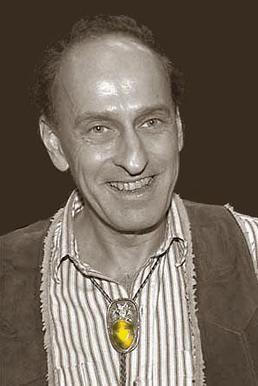
Roger Joseph Zelazny was an American poet and writer of fantasy and science fiction short stories and novels, best known for The Chronicles of Amber. He won the Nebula Award three times and the Hugo Award six times, including two Hugos for novels: the serialized novel ...And Call Me Conrad (1965), subsequently published under the title This Immortal (1966) and then the novel Lord of Light (1967).

Jack McDevitt is an American science fiction author whose novels frequently deal with attempts to make contact with alien races, and with archaeology or xenoarchaeology. Most of his books follow either superluminal pilot Priscilla "Hutch" Hutchins or galactic relic hunters Alex Benedict and Chase Kolpath. McDevitt has received numerous nominations for Hugo, Nebula, and John W. Campbell awards. Seeker won the 2006 Nebula Award for Best Novel.

Glen David Brin is an American science fiction author. He has won the Hugo, Locus, Campbell and Nebula Awards. His novel The Postman was adapted into a 1997 feature film starring Kevin Costner.

Gene Rodman Wolfe was an American science fiction and fantasy writer. He was noted for his dense, allusive prose as well as the strong influence of his Catholic faith. He was a prolific short story writer and novelist, and won many literary awards. Wolfe has been called "the Melville of science fiction", and was honored as a Grand Master by the Science Fiction and Fantasy Writers of America.

Jeff VanderMeer is an American author, editor, and literary critic. Initially associated with the New Weird literary genre, VanderMeer crossed over into mainstream success with his bestselling Southern Reach Trilogy. The trilogy's first novel, Annihilation, won the Nebula and Shirley Jackson Awards, and was adapted into a Hollywood film by director Alex Garland. Among VanderMeer's other novels are Shriek: An Afterword and Borne. He has also edited with his wife Ann VanderMeer such influential and award-winning anthologies as The New Weird, The Weird, and The Big Book of Science Fiction.

Joe William Haldeman is an American science fiction author.
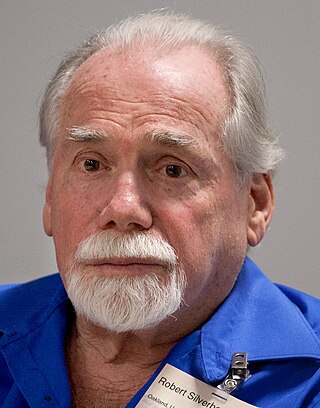
Robert Silverberg is an American author and editor, best known for writing science fiction. He is a multiple winner of both Hugo and Nebula Awards, a member of the Science Fiction and Fantasy Hall of Fame, and a Grand Master of SF. He has attended every Hugo Award ceremony since the inaugural event in 1953.

The Forever War (1974) is a military science fiction novel by American author Joe Haldeman, telling the contemplative story about human soldiers fighting an interstellar war against an alien civilization known as the Taurans. It won the Nebula Award in 1975 and the Hugo and Locus awards in 1976. Forever Free (1999) and Forever Peace (1997) are, respectively, direct and thematic sequel novels. The novella A Separate War (1999) is another sequel of sorts, occurring simultaneously with the final portion of The Forever War. Informally, the novels comprise The Forever War series; the novel also inspired a comic book and a board game. The Forever War is the first title in the SF Masterworks series.
The Forever War series is a series of science fiction novels by Joe Haldeman. Not all of them take place in the same future universe.

Tehanu, initially subtitled The Last Book of Earthsea, is a fantasy novel by the American author Ursula K. Le Guin, published by Atheneum in 1990. It is the fourth novel set in the fictional archipelago Earthsea, following almost twenty years after the first three Earthsea novels (1968–1972), and not the last, despite its subtitle. It won the annual Nebula Award for Best Novel and the Locus Award for Best Fantasy Novel.
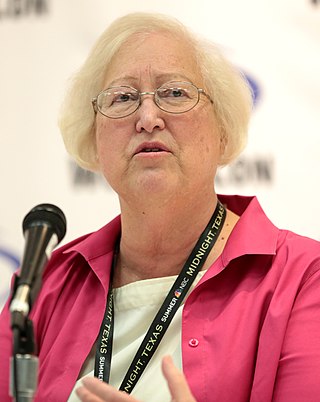
Constance Elaine Trimmer Willis, commonly known as Connie Willis, is an American science fiction and fantasy writer. She has won eleven Hugo Awards and seven Nebula Awards for particular works—more major SF awards than any other writer—most recently the "Best Novel" Hugo and Nebula Awards for Blackout/All Clear (2010). She was inducted by the Science Fiction Hall of Fame in 2009 and the Science Fiction Writers of America named her its 28th SFWA Grand Master in 2011.

The Time Ships is a 1995 hard science fiction novel by Stephen Baxter. A canonical sequel to the 1895 novella The Time Machine by H. G. Wells, it was officially authorized by the Wells estate to mark the centenary of the original's publication. The Time Ships won critical acclaim. It won the John W. Campbell Memorial Award and the Philip K. Dick Award in 1996, as well as the British Science Fiction Association Award in 1995. It was also nominated for the Hugo, Clarke and Locus Awards in 1996.

Forever Peace is a 1997 science fiction novel by Joe Haldeman. It won the Nebula Award, Hugo Award and John W. Campbell Memorial Award in 1998.

Nina Kiriki Hoffman is an American fantasy, science fiction and horror writer.
Jack Dann is an American writer best known for his science fiction, as well as an editor and a writing teacher, who has lived in Australia since 1994. He has published over seventy books, the majority being as editor or co-editor of story anthologies in the science fiction, fantasy and horror genres. He has published nine novels, numerous shorter works of fiction, essays, and poetry, and his books have been translated into thirteen languages. His work, which includes fiction in the science fiction, fantasy, horror, magical realism, and historical and alternative history genres, has been compared to Jorge Luis Borges, Roald Dahl, Lewis Carroll, J. G. Ballard, and Philip K. Dick.
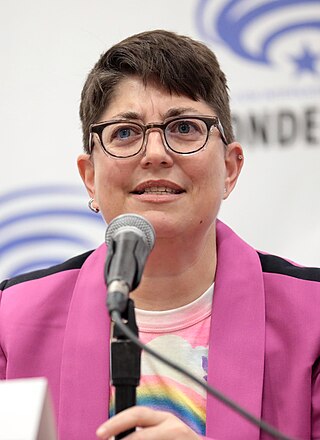
Annalee Newitz is an American journalist, editor, and author of both fiction and nonfiction, who has written for the periodicals Popular Science and Wired. From 1999 to 2008, Newitz wrote a syndicated weekly column called Techsploitation, and from 2000 to 2004 was the culture editor of the San Francisco Bay Guardian. In 2004, Newitz became a policy analyst at the Electronic Frontier Foundation. With Charlie Jane Anders, they also co-founded Other magazine, a periodical that ran from 2002 to 2007. From 2008 to 2015, Newitz was editor-in-chief of Gawker-owned media venture io9, and subsequently its direct descendant Gizmodo, Gawker's design and technology blog. As of 2019, Newitz is a contributing opinion writer at The New York Times.

Martha Wells is an American writer of speculative fiction. She has published a number of fantasy novels, young adult novels, media tie-ins, short stories, and nonfiction essays on fantasy and science fiction subjects. Her novels have been translated into twelve languages. Wells has won four Hugo Awards, two Nebula Awards and three Locus Awards for her science fiction series The Murderbot Diaries. She is also known for her fantasy series Ile-Rien and The Books of the Raksura. Wells is praised for the complex, realistically detailed societies she creates; this is often credited to her academic background in anthropology.
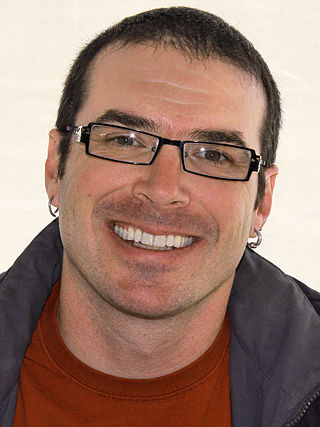
Paolo Tadini Bacigalupi is an American science fiction and fantasy writer. He has won the Hugo, Nebula, John W. Campbell Memorial, Compton Crook, Theodore Sturgeon, and Michael L. Printz awards, and has been nominated for the National Book Award. His fiction has appeared in The Magazine of Fantasy & Science Fiction, Asimov's Science Fiction, and the environmental journal High Country News. Nonfiction essays of his have appeared in Salon.com and High Country News, and have been syndicated in newspapers, including the Idaho Statesman, the Albuquerque Journal, and The Salt Lake Tribune.
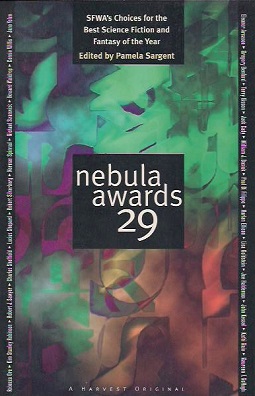
Nebula Awards 29 is an anthology of award-winning science fiction short works edited by Pamela Sargent, the first of three successive volumes under her editorship. It was first published in hardcover and trade paperback by Harcourt Brace in April 1995.

Nebula Awards 26 is an anthology of science fiction short works edited by James Morrow, the first of three successive volumes published under his editorship. It was first published in hardcover and trade paperback by Harcourt Brace Jovanovich in May 1992.

















